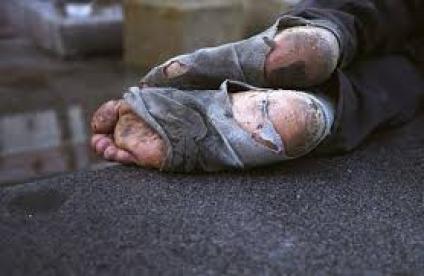This is another extract from ‘Tattoos on the Heart: The Power of Boundless Compassion’ by Father Gregory Boyle which i am reading and thoroughly enjoying [and you should totally get and read] and this story i read tonite jumped out at me and begged to be shared. From a chapter titled, ‘Compassion’:
The strategy of Jesus is not centered in taking the right stand on issues, but rather in standing in the right place – with the outcast and those relegated to the margins.
Once the homeless began to sleep in the church at night, there was always the faintest evidence that they had. Come Sunday morning, we’d foo foo the place as best we could. We would sprinkle ‘I Love My Carpet’ on the rugs and vacuum like crazy. We’d strategically place potpourri and Air Wick around the church to combat this lingering, pervasive reminder – that nearly fifty (and later up to one hundred) men had spent the night there.
About the only time we used incense at Dolores Mission was on Sunday morning, before the 7.30 a.m. Mass crowd would arrive.
Still, try as we might, the smell remained. The grumbling set in, and people spoke of “churching” elsewhere.
It was at about this time that a man drove by the church and stopped to talk to me. he was Latino, in a nice car, and had arrived at some comfortable life and living. He knew I was the pastor. He waxed nostalgic about having grown up in the projects and pointed to the church and said he had been baptised and made his first communion there.
Then he takes in the scene all around him. Gang members gathered by the bell tower, homeless men and women being fed in great numbers in the parking lot. Folks arriving for the AA and NA meetings and the ESL classes.
It’s a Who’s Who of Everybody Who Was Nobody. Gang member, drug addict, homeless, undocumented. This man sees all this and shakes his head, determined and disgusted, as if to say “tsk, tsk.”
“You know”, he says, ” This used to be a church.”
I mount my high horse and say, “You know, most people around here think it’s finally a church.”
Then I ride off into the sunset.
Roll credits.
The smell was nearly overwhelming, just undeniably there. The Jesuits figured that if “we can’t fix it, then we’ll feature it.” So we determined to address the discontent in our homilies one Sunday. Homilies were often dialogic in those days, so one day I begun with, “What’s the church smell like?”
People are mortified, eye contact ceases, women are searching inside their purses for they know not what.
“Come on now,” I throw back at them, “what’s the church smell like?”
“Huele a patas” (Smells like feet), Don Rafael booms out. He was old and never cared what people thought.
“Excellent. But why does it smell like feet?”
“Cuz many homeless men slept here last night?” says a woman.
“Well, why do we let that happen here?”
“Es nuestro compromiso” (It’s what we’ve committed to do), says another.
“Well, why would anyone commit to do tha?”
“Porque es lo que haria Jesus” (It’s what Jesus would do.)
“Well, then… what’s the church smell like now?”
A man stands and bellows, “Huele a nuestro compromiso” (it smells like commitment).
The place cheers.
Guadalupe waves her arms wildly, “Huele a rosas.” (smells like roses).
The packed church roars with laughter and a new-found kinship that embraced someone else’s odour as their own. The stink in the church hadn’t changed, only how the folks saw it. The people at Dolores Mission had come to embody Wendell Berry’s injuction: “You have to be able to imagine lives that are not yours.”
Scripture scholars contend that the original language of the Beatitudes should not be rendered as “Blessed are the single-hearted” or “Blessed are the peacemakers” or “Blessed are those who struggle for justice.” Greater precision in translation would say, “You’re in the right place if… you are single-hearted or work for peace.” The Beatitudes is not a spirituality, after all. It’s a geography. It tells us where to stand.
Compassion isn’t just about feeling the pain of others; it’s about bringing them in toward yourself. If we love what God loves, then, in compassion, margins get erased. “Be compassionate as God is compassionate,” means the dismantling of barriers that exclude.
In Scripture, Jesus is in a house so packed that no one can come through the door any more. So the people open the roof and lower the paralytic down through it, so Jesus can heal him. The focus of the story is, understandably, the healing of the paralytic. But there is something more significant than that happening here. They’re ripping the roof off the place, and those outside are being let in.
[For the next extract on ‘When enemies work together’ click here]
[To read the post i wrote after listening to Father Gregory Boyle speak at CCDA, click here]






[…] [For the next extract i share from this book, click here] […]
[…] [To read 'A Smell of Feet' click here] […]